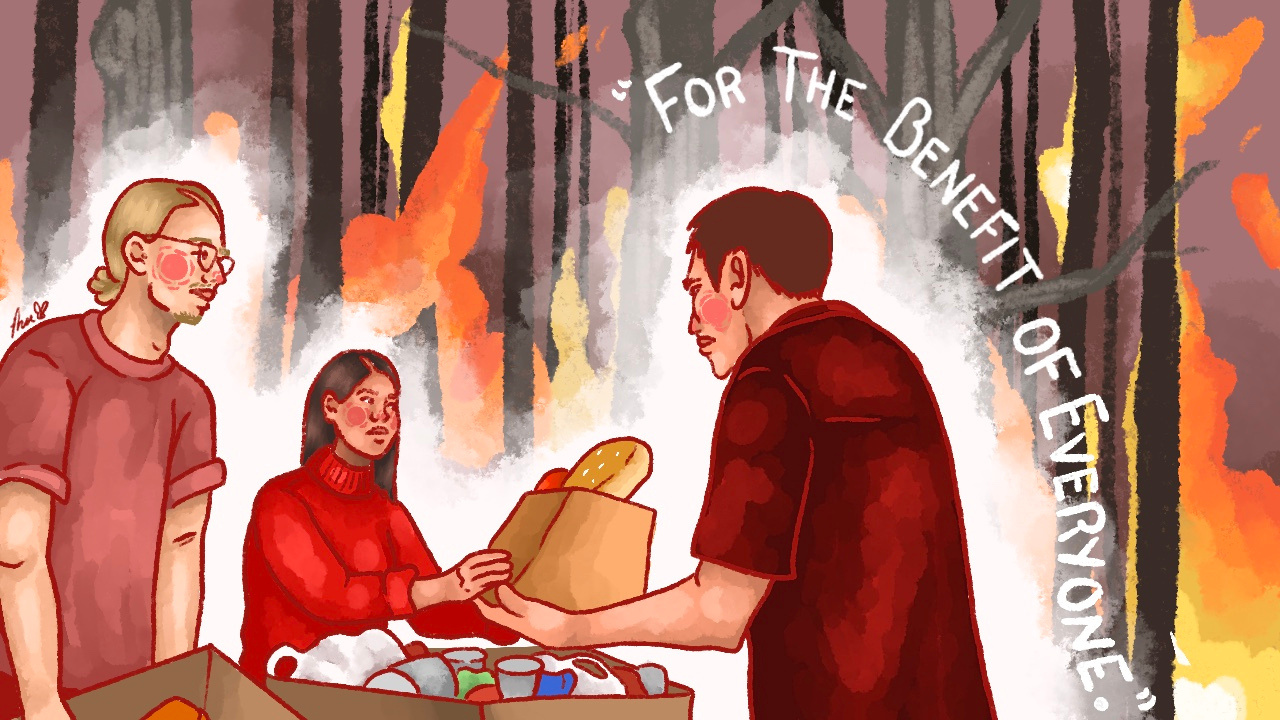
A project by the BCCDC to understand the food and climate experiences of people living in remote communities in British Columbia (BC)
Boston Bar
A Fraser Canyon community severely impacted by
climate events


British
Columbia
Boston Bar
This is the story of the community of Boston Bar, a non-Indigenous community in the Fraser Canyon, as told by six residents.
Where are we located?
Boston Bar is located in traditional Nlaka’pamux (pronounced Ing-khla-kap-muh) Territory in the Fraser Canyon, along Highway 1.
It is halfway between Lytton and Yale along the Fraser River. The area was originally an Indigenous village called Koiaum on the west bank of the Fraser River. The area had active forestry and mill industries, but the community faced challenges after the sawmill closed in 2019. The area is still visited by tourists traveling along the Trans-Canada highway as the 'gateway to the Fraser Canyon'.
Today, the community has about 190 residents and approximately 500 people living in the area, including North Bend and Boothroyd, the nearest First Nations community.



Climate change impacts on community
Boston Bar residents wanted to share the profound impact that climate change events have had on the community and how this has impacted their food access. In late June 2021, an extreme heat dome occurred throughout a significant portion of western North America, resulting in forest fires across BC.
The nearby community of Lytton had much of its town site and surrounding area destroyed by forest fire during this time. Many residents were evacuated, with some temporarily relocated to Boston Bar. As a result, the charitable food system was under increased pressure. In November that year, an ‘atmospheric river' brought significant flooding in the area and caused multiple washouts and rockslides that damaged the road infrastructure.
“2021 was quite literally the year of hell. We had record breaking heat, fires that lasted months, unbelievable flooding, almost a full week of power outage that spoiled all of our fridges and freezers, and then record snowfall and avalanches. All of these were within a six-month period and our highways were either gone, unpassable, unstable or just closed for repairs and crew working.” (MB)
Community response to emergencies
The community came together in remarkable ways during these times. They tirelessly collected donations and planned for the delivery of essential items, sometimes working for up to 20 hours a day. Since the flooding cut off road access; food and medications had to be delivered by helicopter.Community members supported one another by sharing resources and cooking together. Volunteers were critical during this time and made a huge impact.
“Our community has a few staple volunteers; one in particular that takes care of us. Without her our community would greatly suffer during these emergency or stressful times where we need help. We are a small town and mostly otherwise forgotten; this person has a loud voice and asks for what we need for the benefit of everyone.” (Community member)
Accessing market foods


Boston Bar has no local grocery store. Gas stations and convenience stores sell convenience items and some foods but, according to residents, the quality is poor. Many foods are molded, squashed, bruised, rotten, or past their best before dates.
“Food quality is always a concern. If we get lettuce or vegetables, it’s already close to out of date or spoiled; fruit is the same.” (Jayme)
Basic staple food items like milk, bread, eggs, and others are significantly more expensive than at a grocery store. If a person forgets an item when grocery shopping, they may have to do without until the next trip or pay significantly more at a local market. One resident described the struggle with finding nutritious baby foods at local stores.
“We are having to travel all the way to Chilliwack to even feed the baby and get her proper baby foods. Selection is very limited; sometimes you go to the store around here and there's hardly anything… they have very limited items and it's not very kid oriented either or even also that healthy for you. People are forced to shop at these stores when they can’t get out of town.” (Sam)
The nearest grocery store is in Hope which is a 45 minute drive from Boston Bar (65 kilometres). Further down the road is Chilliwack, located 117 kilometres from Boston Bar. Despite the distance Residents often choose to travel to Chilliwack because food options in Hope are limited and expensive, Chilliwack, has large supermarkets such as Superstore and Walmart.
Some residents even make the 2-hour drive to Costco in Abbotsford to stretch their dollars. Other destinations for accessing food and services include Lillooet (3.5 hours round trip), Merritt (4.5 hours round trip), and Kamloops (6 hours round trip).
Residents of the Boston Bar area spend a significant amount of time and effort getting food. Including preparing grocery lists, planning weekly or monthly menus, determining travel times, shopping, unpacking purchased items, organizing food, dividing goods, and freezing or preserving food. Frequently residents combine other errands and appointments into their days spent in the city to make the most of their travel time and expenses. A shopping trip usually takes a full day, leaving people exhausted. It is typical for residents to make this trip once or twice per month.
“Our town suffers greatly. Most of the people here are very low income (working poor, welfare, pensions, disability). A lot cannot afford a vehicle, or the expenses involved in one. They are not able to afford healthy food options and have to buy cheaper and lower quality processed foods that can be stretched farther. People try to always keep their cupboards and freezers well stocked, but with the costs always rising and incomes not, people end up deciding what bills to pay versus what food to buy. Most cannot afford to keep a week’s worth of food on hand, let alone a month or more.” (AH)
Rising fuel prices means trips can cost an extra $80-$200. To share the costs, some families take turns making trips to the store and buying groceries for their families and others'. Some people, like those without vehicles or those who depend on pensions or social assistance may have less frequent access. High costs and limited food access has a mental and physical toll of some residents.
“It’s very stressful. Cost is overwhelming between fuel and food prices skyrocketing. We don’t make more money so now we just eat more junk food. I will not be surprised when our hospitals and medical systems start being inundated with people who are having more health problems related to processed foods.” (MB)
Essential volunteer commitments
Volunteers play an important role in Boston Bar. Almost all grocery stores and other services require vehicles for transportation; the Boston Bar/North Bend Enhancement Society helps the community by providing a weekly shuttle service marketed for elderly people to get to Hope and Chilliwack.
The Boston Bar food bank is a key resource for folks in the community. It is a valued service to the residents with 80 to 90 percent of the community using the food bank to supplement their food supplies. The food bank is volunteer-led but struggles to find enough volunteers to maintain operations.
Ongoing climate change and weather impacts on local food
Residents shared concern over climate change and weather events impacts on locally grown foods and traditional food sources. Residents reported decreasing fish populations, changing spawning seasons and less availability of wild foods such as berries, plants, and mushrooms. Some observed impacts can be attributed to recent wildfires and flooding which affected food sources and wildlife habitats. It is also harder to access these local food sources due to road deterioration, washouts, rockslides, avalanches, and forest fires.
“Berries are not in abundance; salmon runs have thinned to the point of no fishing allowed. Wildlife is hardly seen anymore.” (AH)
“Climate change is changing everything, from our road access to our weather and seasons, from how much rain we get and how much sun, the heat and the cold, the length of our seasons, the flooding and the wildfires. These things impact our foods, delivery, travel and traditional food access.” (Community member)
These climate change and weather events are also impacting efforts to grow foods locally.
“I have grown many of my own vegetables over the years, but in the past number of years nothing has grown due to extremely smoky skies and intense summer heat. No matter how good and nutritious my soil is, things won’t produce properly.” (AH)
Community members are very concerned about climate change, fearing its impact on their food access today, and in the long term.


Hopes for the future
Boston Bar residents recommend:
- A small local grocery store with fresh and healthy food options and reasonable prices.
- Financial assistance to low-income families for food and transportation costs, such as gift cards or other funding stipends.
- Increased funding for the food bank and gardens, including a funded local food security position.
- Support of local farmers, such as existing cattle and chicken farms, to supply beef, chicken and eggs through the local food bank.
- Deliveries of fresh food by refrigerated trucks.
- The enhancement or development of local fresh food and food system infrastructure, including a large greenhouse, secure and accessible gardening space for everyone that is protected (from theft, vandalism, and wildlife), seed donations, and beekeeping.
- Training and resources on canning, preserving, composting, gardening, environmental stewardship, budgeting, sustainable gardening practices (i.e., rainwater capture) and managing finances for community members.
- Better environmental stewardship and protection of animal habitats.
Information for the introduction of the story was obtained from the Boston Bar/North Bend Enhancement Society website and the, Viewpoint from the North website. The Stories Project Team, BC Centre for Disease Control Food Security Team and the Project Advisory Committee would like to sincerely thank the Boston Bar residents interviewed for sharing their stories and experiences. A special thank you to Carly Thompson for her contribution to the project by arranging and conducting interviews, and for taking a lead role at the community level to make this story possible.
For more information about the Food Costs and Climate Change Stories from Remote Communities in British Columbia Project, please email: foodsecurity@bccdc.ca
Illustrator: Moe Butterfly